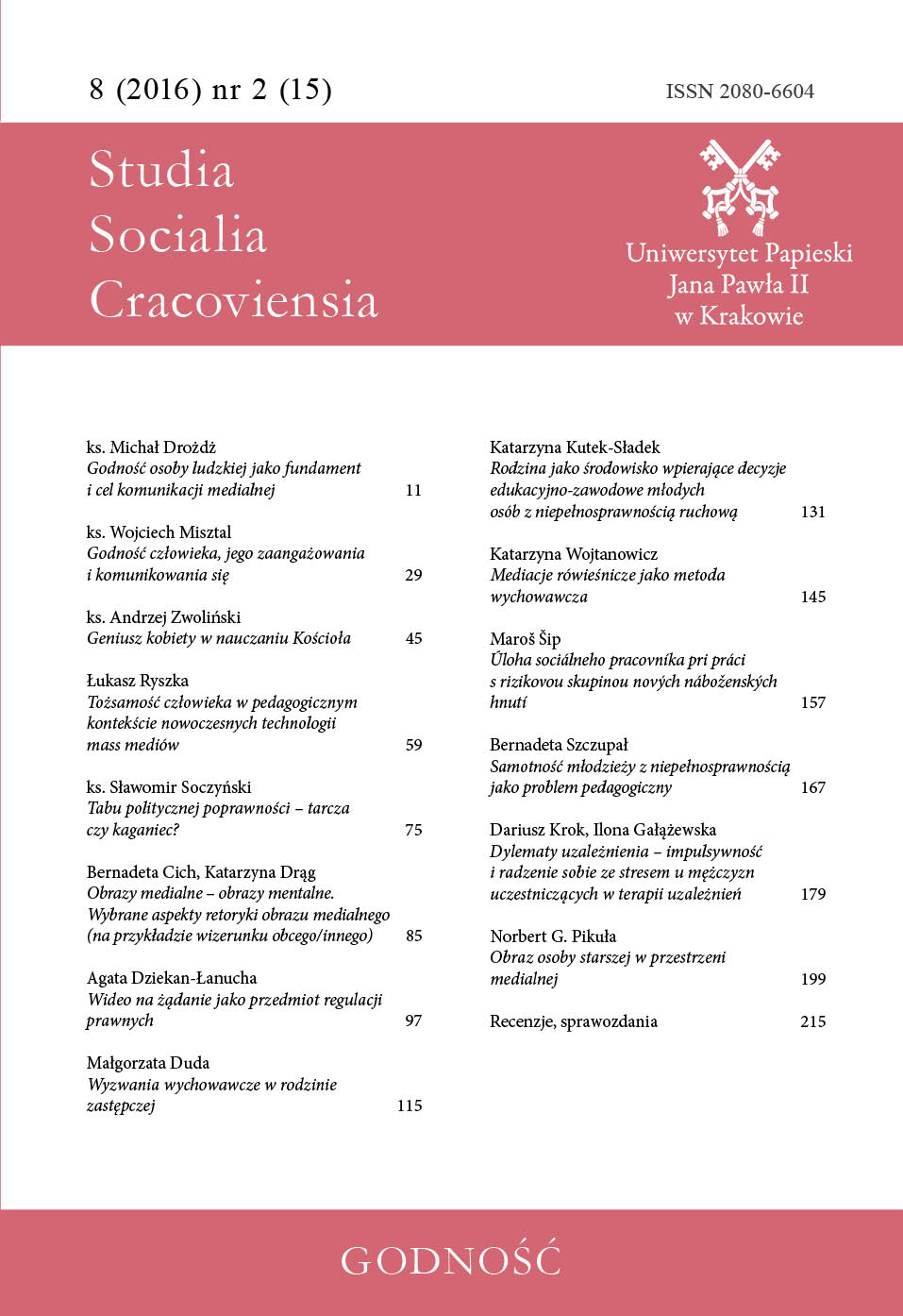Wyzwania wychowawcze w rodzinie zastępczej
DOI:
https://doi.org/10.15633/ssc.2003Słowa kluczowe:
rodzina zastępcza, funcja opiekuńczo‑wychowawcza, nauka społeczna KościołaAbstrakt
Dyskusja ostatnich lat w obszarze funkcjonowania rodziny współczesnej nie słabnie – podkreślane jest jej znaczenie, ale jednocześnie wskazuje się zagrożenie w realizacji jej funkcji opiekuńczo‑wychowawczej. Młodzi ludzie decydujący się na założenie rodziny coraz częściej nie są przygotowani do wyzwań, jakie stawia przed nimi społeczeństwo. Dotyczy to zwłaszcza funkcji rodzicielskiej – coraz więcej dzieci potrzebuje rodziny zastępczej, która otoczy ich – przede wszystkim – miłością, zapewni poczucie bezpieczeństwa. Czy rzeczywiście funkcjonowanie rodziny zastępczej różni się od życia w rodzinie pochodzenia? Jeżeli tak, to co należy robić, by różnice te były jak najmniejsze? Czy w ogóle jest to możliwe? Wreszcie – czy istnieje różnica w realizowaniu funkcji opiekuńczo‑wychowawczej „wczoraj” i „dzisiaj”? Na te i inne pytania spróbuje odpowiedzieć niniejszy artykuł.Bibliografia
Benedykt XVI, Rodzina chrześcijańska wspólnotą wychowania i wiary, http://www.opoka.org.pl/biblioteka/W/WP/benedykt_xvi/przemowienia/rodzina_06062005.html (10.06 2016).
Czeredrecka B., Dom dziecka, w: Formy pracy opiekuńczo‑wychowawczej, red. I. Brągiel, S. Badora, Częstochowa 1997, s. 331–338.
Dąbrowski Z., Teoretyczne podstawy opieki i wychowania opiekuńczego, Toruń 1980.
Dąbrowski Z., Pedagogiczna opiekuńcza, t. 1, Olsztyn 2006.
Dymanus A., Postawy rodziców wobec dzieci oraz świadomość błędów wychowawczych w procesie socjalizacji, http://www.psychologia‑spoleczna.pl/artykuly/1577-postawy‑rodzicow.html (13.06.2016).
Dziecko w rodzinie zastępczej, http://zpppblonie.pl/wp‑content/uploads/2011/05/dziecko_w_rodzinie_zastepczej.pdf (15.06.2016).
Dzieci w Polsce. Dane. Liczby, statystyki, red. E. Falkowska, A. Telusiewicz‑Pacak, Warszawa 2013.
Franciszek, Adhortacja Evangelii gaudium.
Jan Paweł II, Encyklika Evangelium vitae.
Jan Paweł II, Spotkanie z nauczycielami i wychowawcami, Nikaragua 4.03.1983, w: Jan Paweł II, Homilie i przemówienia z pielgrzymek – Ameryka Północna i Południowa, Kraków 2009, s. 899–903 (Dzieła Zebrane, 12).
Konwencja o prawach dziecka, Dz.U. z 1991 r., nr 120, poz. 526 z późn. zm.
Morciniec P., Wobec nienaruszalnego misterium osoby. Humanizm w ujęciu Jana Pawła II, „Studia Teologiczno‑Historyczne Śląska Opolskiego” 2005 nr 25, s. 263–275.
Okoń W., Nowy słowik pedagogiczny, Poznań 2004.
Olbrycht K., Istota wychowania personalistycznego, http://www.stowarzyszeniefidesetratio.pl/Presentations0/01aOlbrycht.pdf (15.06.2016).
Przybyłka A., Rodzinne formy opieki nad dzieckiem w Polsce, „Studia Ekonomiczne” 2014 nr 179, s. 74–84.
Ruszkowska M., Rodzina zastępcza jako środowisko opiekuńczo‑wychowawcze, Warszawa 2013.
Słomian B., W trosce o dobro dziecka, w: W stronę rodzinnej opieki środowiskowej, red. B. Balicka‑Błagitka i in., Opole 2009, s. 9–13.
Sprawozdanie Rady Ministrów z realizacji Ustawy z dnia 4 lutego 2011 r. o opiece nad dziećmi w wieku do lat trzech, Dz.U. z 2013 r. poz. 1457.
Szczypiński O., Odpowiedzialność za życie ludzkie jaako istota przygotowania do małżeństwa, w: Jak przygotować do małżeństwa?, red. R. Sztychmiler, J. Krzywkowska, Olsztyn 2013, s. 245–256.
Urbaniak A., Komplementarność działań rodziny i społeczeństwa w wychowaniu, „Teologia i Moralność” 11 (2012), s. 35–45.
Ustawa z dnia 9 czerwca 2011 r. o wspieraniu rodziny i systemie pieczy zastępczej z późn. zm., Dz.U. z 10 marca 2015 r. poz. 332.
Pobrania
Opublikowane
Numer
Dział
Licencja
Autorzy publikujący w czasopiśmie udzielają jego wydawcy zgody o następującej treści:
- Autor zachowuje autorskie prawa majątkowe do utworu, a jednocześnie udziela wydawcy czasopisma zgody na jego pierwszą publikację w wersji drukowanej i wersji online na licencji Creative Commons Uznanie autorstwa 4.0 Międzynarodowe oraz zgody na wykonywanie opracowań, w tym przekładów.
- Autor ma możliwość udzielania zgody niewyłącznej na opublikowanie utworu w wersji, która ukazała się w czasopiśmie (np. zamieszczenia go w repozytorium instytucjonalnym lub opublikowania w książce), wraz z informacją o jego pierwszej publikacji w czasopiśmie.
- Autor może umieścić swój utwór online (np. w repozytorium instytucjonalnym lub na swojej stronie internetowej) jeszcze przed zgłoszeniem utworu do czasopisma.

